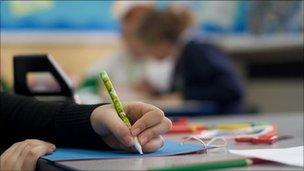Education Scotland says too many schools 'coasting'
- Published

Education Scotland said social disadvantage did not always lead to poor performance at school
Many Scottish schools are less successful than they should be, according to a major new body led by school inspectors.
Education Scotland said there were "few critically under-performing schools, but substantial numbers are coasting".
It wants to see reforms to ensure more children reach their potential.
But the new body said some schools in disadvantaged areas were performing better than others in similarly disadvantaged neighbourhoods.
In an outline of where Scottish education currently stands, it also indicated some schools in affluent areas perform better than others.
Education Scotland said there was a common misperception that only those from the poorest backgrounds were under-achieving at school.
The body indicated that every 10% on a deprivation score appeared to make an impact on how well a child does in school.
Bill Maxwell is the former head of Her Majesty's Inspectorate of Education, which has taken over Learning and Teaching Scotland, a government body which produced materials and information for schools.
More autonomous
Now transitional head of the new amalgamated body, called Education Scotland, he told the BBC it was "not inevitable" that social disadvantage leads to poor progress at school.
"We all know examples of people who have broken that trend," he said.
"It is fair to say that in most countries there is a link between children's background and how well they do at school - but other countries are better at avoiding making that a strong link."
Commenting on the move to so-called "light touch" inspections, Mr Maxwell said parents should have confidence in it.
"It is not vague. It is certainly not less challenging. It is quite a challenging process, as any school who's been through it will testify," he said.
Mr Maxwell indicated his organisation was moving towards coaching staff and schools to help them move up a gear rather than inspecting them.
He also indicated that although teachers may become more autonomous than in the past they would also be more accountable for results.
Lindsay Paterson, professor of education policy at the University of Edinburgh, said he welcomed the move to devolve more responsibility to schools so that teachers were "more in charge".
But he said overall he found Education Scotland's improvement strategies "vague".
"It is all very well for someone at national level to say everything has got to improve but without saying something about what direction there is to be, it really isn't very helpful at all," Mr Paterson said.
"What kind of improvement do we want? What sort of learning do we want children to have and what sort of learning do we want teachers to have? All these things are completely lacking at the moment from this statement."
Educational gap
Education Scotland said research indicated Scotland was doing reasonably well - with graduates making up 34% of the population, on a par with the UK average and way above the level in Turkey, which at 14% is bottom of the scale in the developed world.
But Scotland was well behind Canada, the top performer at 49%.
In reading and science Scotland was above average but in maths it was just above average - eclipsed by countries such as China, Singapore and Finland.
Too many Scots schools 'coasting'
In terms of exam results Scotland has demonstrated weak improvement in the past decade.
It also confirmed that the educational gap between the haves and the have-nots was already pronounced when they start school.
Those from the most advantaged backgrounds could be up to 13 months ahead in their ability to solve problems and up to 18 months in terms of "expressive vocabulary".
Among the reforms Education Scotland wants to see is an overhaul of recruitment practice to ensure a higher calibre entering teacher training.
It also wants to see improvements in initial training courses.
To help those already working become more effective it suggests better in-service training, systematic appraisal and targeted coaching.
But it suggested that teachers could learn more from their peers than from formal courses.
It called for more opportunities to share information and skills and more opportunities to be seconded to different schools.
- Published16 September 2011
- Published14 September 2011
- Published25 February 2011
- Published28 January 2011